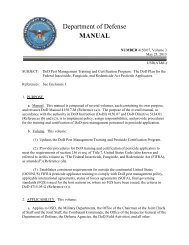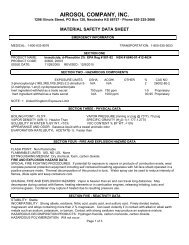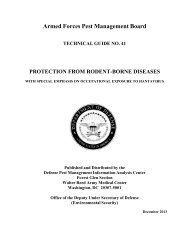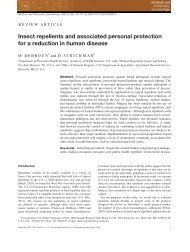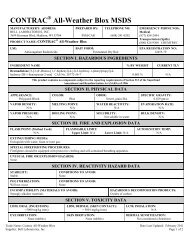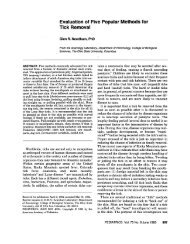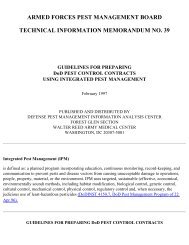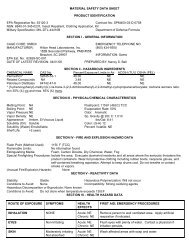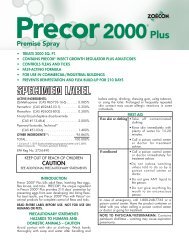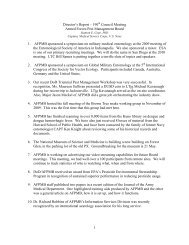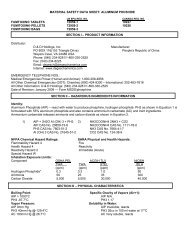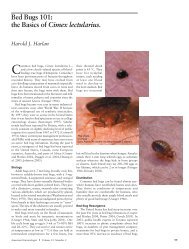Caribbean - Armed Forces Pest Management Board
Caribbean - Armed Forces Pest Management Board
Caribbean - Armed Forces Pest Management Board
Create successful ePaper yourself
Turn your PDF publications into a flip-book with our unique Google optimized e-Paper software.
PREFACE<br />
Disease Vector Ecology Profiles (DVEPs) summarize unclassified literature on medically important<br />
arthropods, vertebrates and plants that may adversely affect troops in specific countries or regions<br />
around the world. Primary emphasis is on the epidemiology of arthropod-borne diseases and the<br />
bionomics and control of disease vectors. DVEPs have proved to be of significant value to<br />
commanders, medical planners, preventive medicine personnel, and particularly medical entomologists.<br />
These people use the information condensed in DVEPs to plan and implement prevention and control<br />
measures to protect deployed forces from disease, injury, and annoyance caused by vector and pest<br />
arthropods. Because the DVEP target audience is also responsible for protecting troops from<br />
venomous animals and poisonous plants, as well as zoonotic diseases for which arthropod vectors are<br />
unknown, limited material is provided on poisonous snakes, noxious plants, and rodent-borne diseases<br />
such as hantavirus and leptospirosis.<br />
In this document vector-borne diseases are presented in two groups: those with immediate impact on<br />
military operations (incubation period < 15 days) and those with delayed impact on military operations<br />
(incubation period > 15 days). For each disease, information is presented on military importance,<br />
transmission cycle, vector profiles, and vector surveillance and suppression.<br />
Additional information on venomous vertebrates and noxious plants is available in the <strong>Armed</strong> <strong>Forces</strong><br />
Medical Intelligence Center’s (AFMIC) Medical, Environmental, and Disease Intelligence, and<br />
Countermeasures (MEDIC) CD-ROM.<br />
Contingency Operations Assistance: The <strong>Armed</strong> <strong>Forces</strong> <strong>Pest</strong> <strong>Management</strong> <strong>Board</strong> (AFPMB) is<br />
staffed with a Contingency Liaison Officer (CLO), who can help identify appropriate DoD personnel,<br />
equipment, and supplies necessary for vector surveillance and control during contingencies. Contact<br />
the CLO at Tel: (301) 295-8312, DSN: 295-8312, or Fax: (301) 295-7473.<br />
Defense <strong>Pest</strong> <strong>Management</strong> Information Analysis Center (DPMIAC) Services: In addition to<br />
providing DVEPs, DPMIAC publishes Technical Guides (TGs) and the Military <strong>Pest</strong> <strong>Management</strong><br />
Handbook (MPMH). DPMIAC can provide online literature searches of databases on pest<br />
management, medical entomology, pest identification, pesticide toxicology, venomous snakes,<br />
poisonous plants and other biomedical topics. Contact DPMIAC at Tel: (301) 295-7476, DSN:<br />
295-7476, or Fax: (301) 295-7473. Additional hard copies or diskettes of this publication are also<br />
available.<br />
Other Sources of Information: The epidemiologies of arthropod-borne diseases are constantly<br />
changing, especially in developing countries undergoing rapid growth, ecological change, and/or large<br />
migrations of refugee populations resulting from civil strife. In addition, diseases are underreported in<br />
developing countries with poor public health infrastructures. Therefore, DVEPs should be<br />
supplemented with the most current information on public health and geographic medicine. Users may<br />
obtain current disease risk assessments, additional information on parasitic and infectious diseases, and<br />
i




